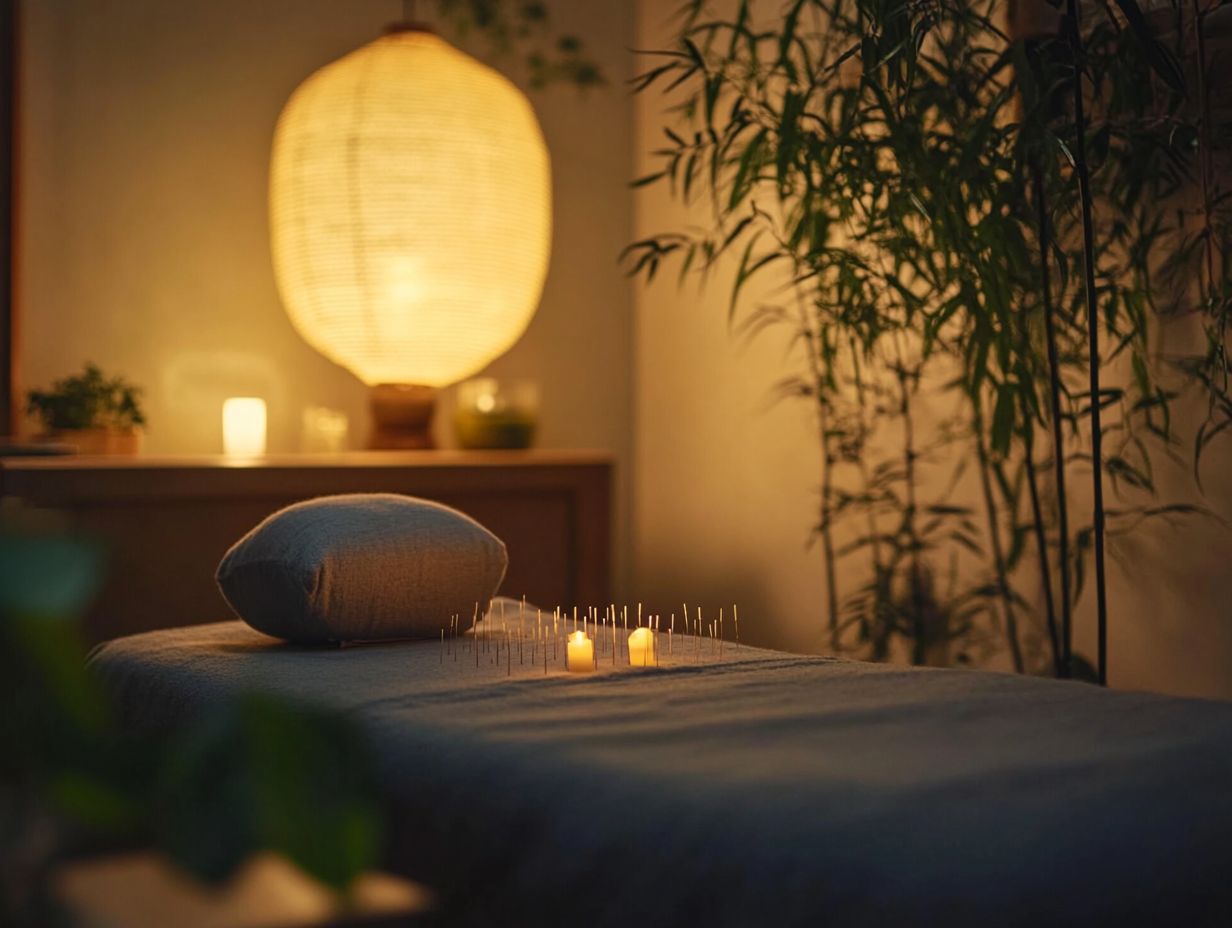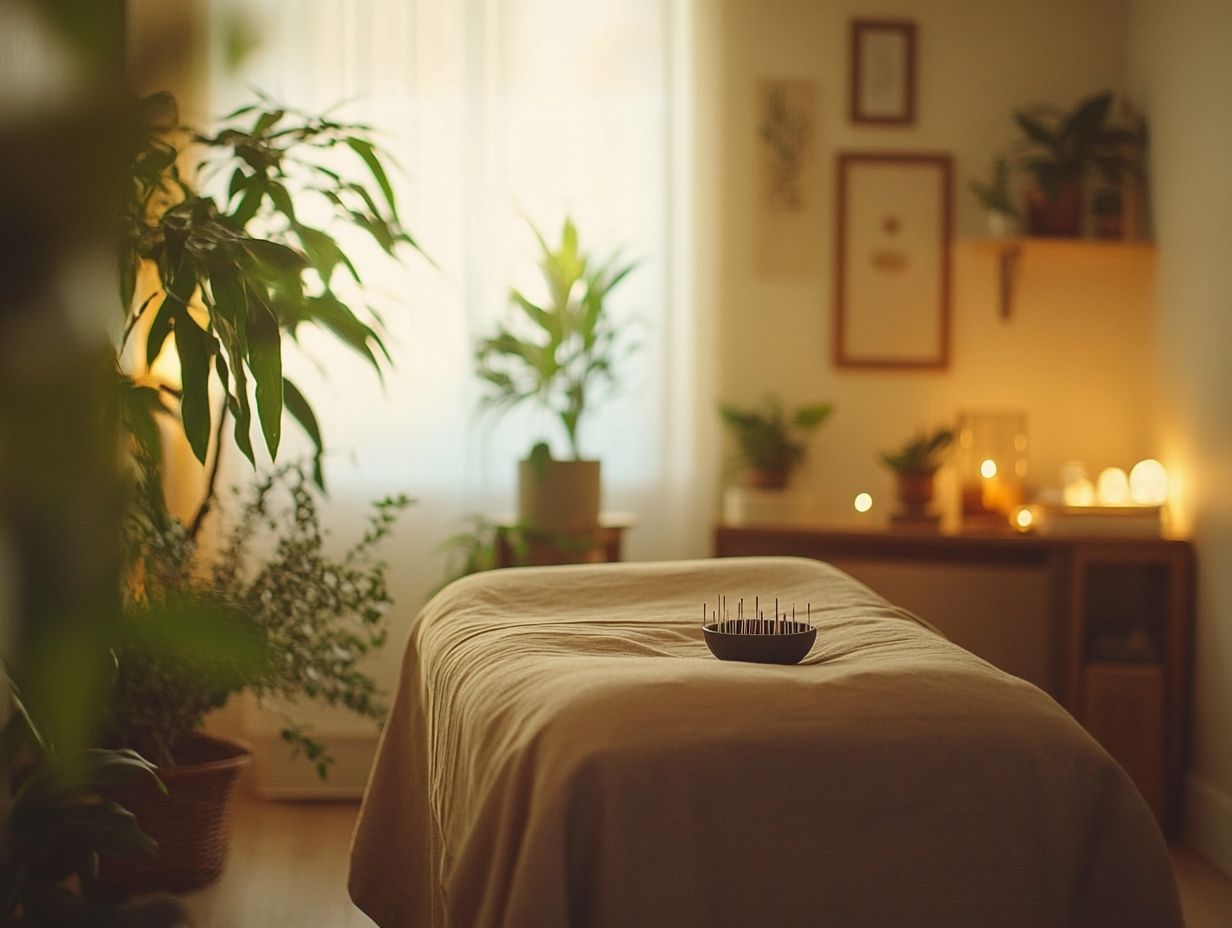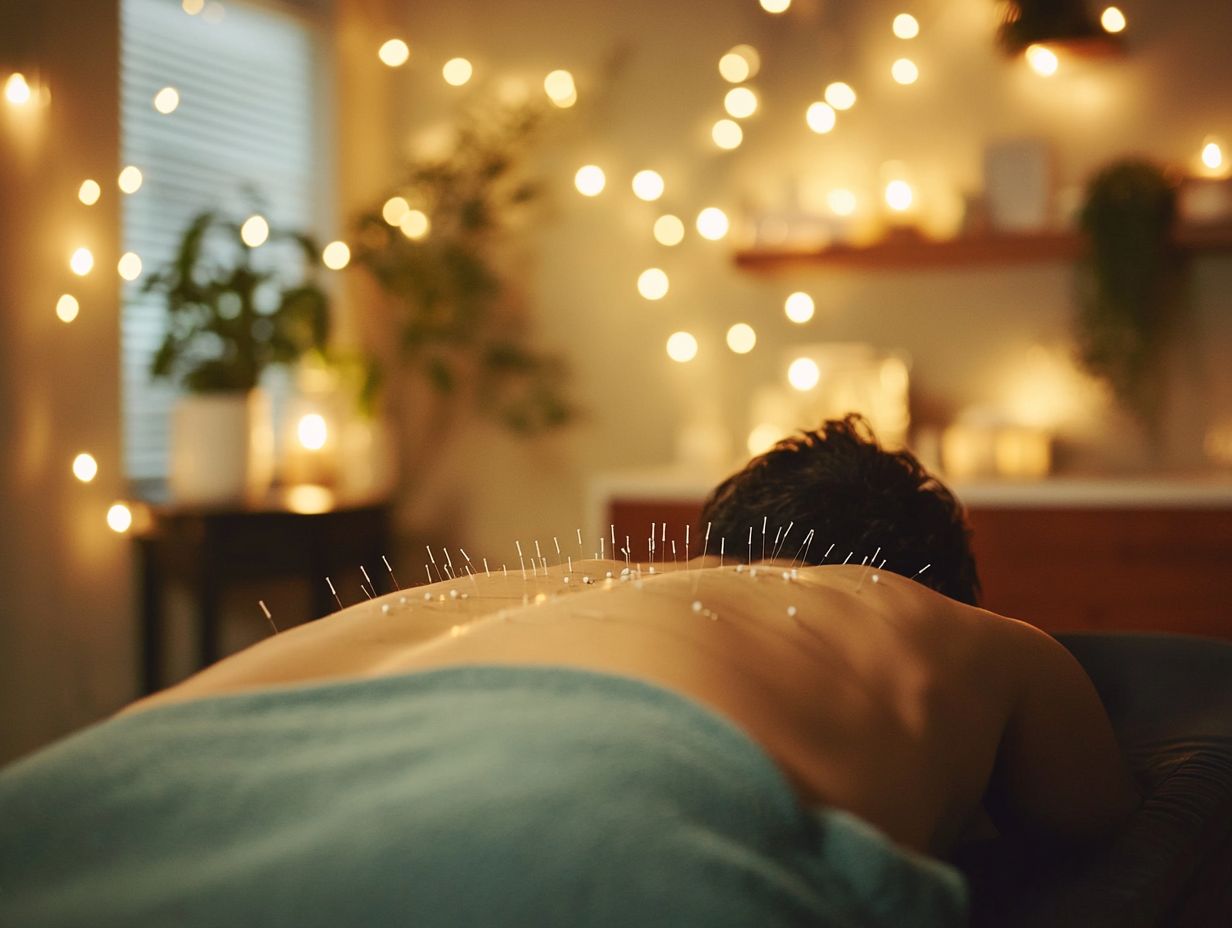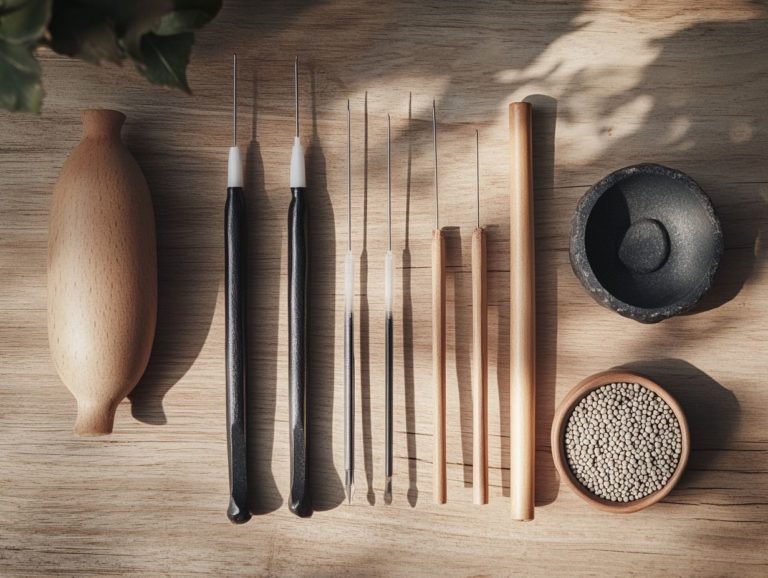5 Ways Acupuncture Can Help with Stress Relief
Stress can often feel like an insurmountable weight, affecting both your mental clarity and physical vitality.
Fortunately, acupuncture presents a holistic solution for managing stress and fostering relaxation. This ancient practice does more than just involve needles; it stimulates the release of endorphins and enhances sleep quality, offering a wealth of benefits that extend beyond traditional therapies.
Join us in exploring five compelling ways acupuncture can ease your stress, uncover its underlying mechanisms, and examine various types, potential side effects, and how it can synergize with other stress-relief techniques. Don t miss out on learning how acupuncture can transform your life!
Contents
- Key Takeaways:
- 1. Relax and Unwind with Acupuncture
- 2. Stimulates the Release of Endorphins
- 3. Improves Sleep Quality
- 4. Balances Hormones
- 5. Reduces Anxiety and Depression Symptoms
- Understanding Acupuncture: What It Is and How It Works
- Frequently Asked Questions
- What is acupuncture and how does it work?
- How can acupuncture help with stress relief?
- What are the 5 ways acupuncture can specifically help with stress relief?
- Is acupuncture safe for stress relief?
- Are there any side effects of acupuncture for stress relief?
- How often should I receive acupuncture for stress relief?
Key Takeaways:

Acupuncture helps you relax and relieve tension efficiently. By stimulating the release of endorphins, acupuncture can naturally elevate your mood and create a sense of well-being, making it an effective stress management tool. Acupuncture also improves sleep quality, allowing for better rest and helping to reduce the negative effects of chronic stress on the body.
1. Relax and Unwind with Acupuncture
Acupuncture stands as a time-honored method that promotes relaxation and alleviates tension. It skillfully addresses the mental and physical health challenges tied to chronic stress, anxiety, and emotional imbalance.
By strategically inserting needles at specific points on your body, it enhances the flow of Qi and overall wellness. This technique works wonders by modulating the autonomic nervous system, helping you relax more deeply and significantly lowering stress hormone levels like cortisol.
Picture this: when you combine acupuncture with mindfulness practices such as meditation or deep breathing exercises you further amplify that relaxation response, cultivating an enduring sense of calm.
During an acupuncture session, the release of endorphins not only helps to alleviate pain but also instills a profound feeling of well-being. Integrating these self-care practices fosters a mindfulness-based approach to healing while enhancing your resilience to stress, ultimately leading to improved mental clarity and emotional stability.
2. Stimulates the Release of Endorphins
Acupuncture works wonders by stimulating the release of endorphins, which are your body’s natural painkillers. These endorphins play a pivotal role in relieving stress and enhancing your mental health while effectively addressing symptoms of anxiety and depression.
This intricate physiological process kicks off when fine needles are inserted at specific points, activating your nervous system and prompting the secretion of neurotransmitters. As endorphins flood your system, they not only diminish your perception of pain but also uplift your mood, providing a holistic pathway to healing.
Research shows that many patients experience significant reductions in chronic pain conditions, coupled with improvements in their emotional well-being. Individuals who undergo regular acupuncture sessions often share that it alleviates their discomfort and cultivates a sense of emotional resilience, contributing to their overall wellness.
This dual action clearly highlights the profound impact acupuncture can have on both the body and the mind.
3. Improves Sleep Quality
Acupuncture has been proven to significantly improve sleep quality, presenting a compelling treatment option for those grappling with insomnia and sleep disturbances often intensified by stress and anxiety.
By addressing hormonal imbalances and alleviating mental strain, acupuncture directly targets the root causes that disrupt your healthy sleep patterns. Practitioners stimulate specific points on your body to release endorphins and regulate cortisol levels, which frequently rise in response to chronic stress.
When paired with relaxation techniques like mindfulness meditation and deep-breathing exercises, acupuncture can further amplify treatment effectiveness, creating a comprehensive strategy for achieving better sleep outcomes.
Prioritizing restorative sleep not only enhances your physical health but also elevates your emotional well-being, ultimately improving your overall quality of life. This allows you to tackle daily challenges with renewed energy and focus.
4. Balances Hormones

Acupuncture plays a crucial role in balancing hormones that can easily be thrown off-kilter by chronic stress. This leads to enhancements in emotional stability, mental health, and overall well-being.
In today s fast-paced world, high stress levels often result in hormonal imbalances, contributing to conditions like anxiety, depression, and fatigue. This ancient practice targets specific points in your body, promoting the release of hormones and alleviating the impacts of stress-induced fluctuations.
If you’re a woman grappling with PMS or menopause, start regular acupuncture sessions for quicker relief from mood swings and irritability. If you re feeling fatigued from thyroid issues, acupuncture may help you experience significant improvements.
By addressing the underlying hormonal disruptions, acupuncture offers a holistic approach to restoring balance and enhancing both your mental and physical health.
5. Reduces Anxiety and Depression Symptoms
Acupuncture serves as a powerful ally in your journey to reduce anxiety and depression symptoms. It offers a holistic approach to mental health by targeting the root causes of emotional distress.
This ancient practice activates your body’s intricate network of energy pathways, stimulating specific points that influence the release of neurotransmitters like serotonin and endorphins essential players in mood regulation.
Enhancing your emotional stability through acupuncture lays a solid foundation for integrating other therapeutic methods, such as cognitive behavioral therapy and mindfulness techniques.
When you combine these approaches with acupuncture, you can significantly elevate your mental health outcomes. Many people like you feel a renewed sense of well-being after acupuncture, leading to diminished emotional turmoil and greater resilience against stress, ultimately nurturing a more balanced and fulfilling life.
Understanding Acupuncture: What It Is and How It Works
Acupuncture, a vital element of Traditional Chinese Medicine, involves the precise insertion of fine needles at designated energy pathway points to harmonize Qi, the body’s essential energy. This practice not only promotes healing but also enhances overall wellness, offering an array of physical and mental health benefits.
Dating back over 2,500 years, acupuncture has established itself as a revered remedy embraced by diverse cultures worldwide. It is grounded in the understanding that a balanced flow of energy is key to good health.
By targeting specific points, acupuncture stimulates the nervous system and improves blood circulation. Numerous studies validate its effectiveness in alleviating chronic pain, relieving symptoms of anxiety, and assisting with conditions such as migraines and insomnia.
Historical accounts reveal its use by ancient Chinese practitioners to restore balance, highlighting the extensive therapeutic potential that acupuncture continues to offer today.
What Are the Different Types of Acupuncture?
You ll find several types of acupuncture, each meticulously designed to address specific health concerns. From Traditional Chinese Acupuncture to Japanese Acupuncture and Electro-Acupuncture, each style employs distinct techniques and philosophies aimed at enhancing your well-being.
These diverse approaches not only reflect varying cultural philosophies but also cater to your individual needs and conditions, making acupuncture a remarkably versatile choice. Traditional Chinese Acupuncture focuses on balancing your body s energy, or Qi, to alleviate ailments such as chronic pain and digestive issues.
On the other hand, Japanese Acupuncture tends to be gentler, using fewer needles to foster relaxation and emotional well-being, which is especially beneficial if you re dealing with anxiety or depression.
Meanwhile, Electro-Acupuncture introduces electrical stimulation to amplify the effectiveness of traditional techniques, proving particularly advantageous for chronic pain management.
Each of these methods is thoughtfully designed to effectively target specific symptoms, offering a holistic approach to healing that can be tailored to your unique health issues and overall wellness goals.
What Are the Potential Side Effects of Acupuncture?

Acupuncture is generally safe, but consider potential side effects. You might feel soreness at needle sites, minor bruising, or temporary emotional changes.
These side effects usually resolve within hours or days. It s important to be aware of your unique sensitivities.
If you re thinking about acupuncture, inform your acupuncturist about any pre-existing conditions or medications you take. This helps tailor the treatment to your needs.
Choose a practitioner who is licensed and experienced. This choice minimizes risks and enhances your acupuncture experience.
How Many Sessions of Acupuncture Are Needed for Stress Relief?
The number of sessions for effective stress relief can vary. Many people benefit from 6 to 10 sessions, based on their treatment plan and health condition.
Factors like the severity of your stress can influence this number. If you experience chronic stress, you may need more frequent sessions than someone with mild stress.
Practitioners customize treatment plans to fit your situation. For high-stress jobs, more frequent sessions may be necessary, while others might do well with a gradual schedule.
Your practitioner s recommendations, based on your progress, are crucial in determining the total visits needed for the best results.
Can Acupuncture Be Used with Other Stress-Relieving Techniques?
Acupuncture works well with other stress-reliefs like mindfulness, meditation, and therapy. Combining these can greatly enhance your emotional balance and well-being.
By blending these approaches, you can achieve deeper relaxation and clarity. For example, using mindfulness with acupuncture can improve your focus.
Incorporating therapy helps change negative thought patterns while acupuncture addresses physical stress symptoms. Together, they improve your mental health and physical wellness.
Many patients report better sleep and less muscle tension. This holistic approach is effective for sustained stress relief and boosts your overall vitality.
What Are the Other Benefits of Acupuncture?
Besides stress relief, acupuncture offers many benefits. It can relieve pain from chronic conditions, strengthen your immune system, and support digestive health.
Acupuncture can alleviate symptoms of heart disease, like hypertension, by improving circulation and reducing inflammation.
If you suffer from migraines, acupuncture may help reduce the frequency and intensity of attacks, balancing neurotransmitters and easing tension.
This holistic approach promotes natural healing, enhancing your quality of life in meaningful ways.
Frequently Asked Questions

What is acupuncture and how does it work?
Acupuncture is an ancient Chinese practice. It involves inserting thin needles into specific points on the body to stimulate energy flow.
When this energy flow gets disrupted, it can lead to issues like stress. Acupuncture aims to restore this balance and promote overall well-being.
How can acupuncture help with stress relief?
Acupuncture helps relieve stress in several ways. It promotes relaxation and improves sleep quality.
This practice also reduces muscle tension and stimulates endorphin release, the body’s natural feel-good hormones. These effects create a sense of calm and well-being.
What are the 5 ways acupuncture can specifically help with stress relief?
Acupuncture helps with stress relief through five main benefits: promoting relaxation, improving sleep quality, reducing muscle tension, releasing endorphins, and balancing energy flow in the body. For more details on how it can enhance your well-being, check out 5 ways acupuncture can improve your mood. Together, these benefits alleviate stress and its effects.
Is acupuncture safe for stress relief?
Yes! Acupuncture is considered a safe and effective treatment for stress relief.
The needles used are thin and sterile, minimizing the risk of infection. Always ensure you are treated by a licensed and experienced acupuncturist for safety.
Are there any side effects of acupuncture for stress relief?
While acupuncture is generally safe, some may experience mild bruising or soreness at the needle site. These side effects are temporary and resolve quickly.
Discuss any concerns with your acupuncturist before treatment to feel confident in your care.
How often should I receive acupuncture for stress relief?
The frequency of treatments varies based on individual needs and symptom severity. Some may benefit from weekly sessions, while others might need monthly visits.
Your acupuncturist will create a personalized treatment plan tailored to your specific needs!



![5 Local Acupuncture Clinics in [Your City] to Visit](https://alternativeace.com/wp-content/uploads/2024/09/5-local-acupuncture-clinics-in-your-city-to-visit-8f-768x578.jpeg)


